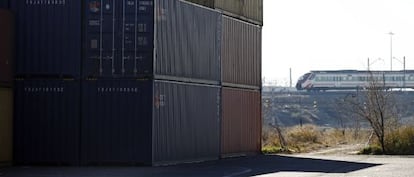All aboard the Spain-China train?
Low temperatures and high costs are making exporters reluctant to use the new rail route

On December 10, the first freight train to travel direct between China and Spain chugged into Madrid. The 13,000-kilometer Yixinou rail route is the longest in the world, linking Yiwu on China’s east coast with the Spanish capital. Conceived as a huge two-way trade highway between the two countries, it brought all kinds of consumer items along what has been dubbed the new silk road, and the idea is that it will return to China filled with Spanish wine, olive oil, milk, and even cured ham for China’s burgeoning middle classes. But plans for the train to begin its 21-day journey back in time for the Chinese New Year on February 19 are on hold, and for the moment, its 30 dark blue containers remain stacked up in the Abroñigal rail depot in Madrid.
The sub-zero temperatures that the train will encounter as it passes through Russia, Kazakhstan, and eastern China, along with the high cost of moving goods aboard it, are the main reasons Spanish exporters are reluctant to use the Yixinou train to ship their products for the moment. An official delegation from Yiwu arrives in Madrid this week to try to get a project moving that is very important to the Chinese authorities. A second train bringing Chinese goods is due to arrive in Madrid at the beginning of February.
We’ve accepted that our goods won’t get to China in time for the New Year celebrations there” Daniel Campos, Cobocalleja.info
The route that connects Madrid with Yiwu is part of a much bigger project that Beijing hopes will open up the interior of China. At the same time as fomenting trade with western Europe, the idea is to create new branches from the silk road, connecting with markets in Russia, Mongolia, Kazakhstan, and even Myanmar, Bangladesh, and India.
The difficulties in persuading Spanish businesses to sign up in part illustrates Spain’s trade imbalance, which is heavily in favor of China: the country’s trade deficit with China was €13.4 billion in 2013. That said, exports are growing, and China is now Spain’s fourth-largest non-EU market, after the United States, Morocco, and Turkey. A total of 12,878 Spanish companies exported goods to China last year.
The Yixinou is faster and more reliable than shipping, making it particularly attractive for exporters of perishable and electronic goods. The problem is that it’s up to 30 percent more expensive than maritime travel. Julia Zhang, the director of Orient Consulting, which aims to boost trade ties between China and Spain, has been monitoring the Yixinou initiative closely: “Until now, containers carried aboard ships took up to 45 days to travel from China to Spain. The train is more expensive, but it could be the solution for Spanish exporters that don’t want to have to take their goods through ports.”
Yiwu, the train’s final destination in China, is a vast manufacturing and trading hub located in the eastern coastal province of Zhejiang, where around 70 percent of Chinese immigrants in Spain come from. With its strong ties to their country of origin, the Yixinou has aroused interest among Spain’s Chinese business community. Zhang says the original idea was to export wine and oil aboard the train: “Chinese businesses in Spain are selling a lot of wine and oil to China. A bottle costing €10 here can be sold very easily there for €30. What’s more, the Chinese are drinking larger and larger amounts of Spanish wine. People have more money and are becoming aware of other wines than France’s.”
The wine bottles froze and exploded en route. Maybe in the spring we could try” César Jiménez of exporter Kerry Logistics
The popularity of olive oil has also soared in recent years in China, where its health-giving properties are increasingly appreciated. “Spanish olive oil has become fashionable in China. It has a good image,” says Fernando Ortega, director of iloveaceite.com, which sells Spanish olive oil around the world. But he believes that for the moment, sea transport will continue to be the preferred option for olive oil exporters, based simply on cost. “Exporters analyze costs down to the last cent. And until prices are adjusted, I don’t think the train is an option in the short term,” he says by phone shortly before leaving on one of his frequent trips to China in search of new markets.
Tufan Khalaji, the director of InterRail Services GmbH, the German transport and logistics company that is part of the Yixinou operation, outlines some of the issues Spanish producers of wine and olive oil face in exporting their goods to China. “The temperatures on the route can reach 30ºC below zero, which will damage wine and oil unless they are kept in special containers.” One solution is for goods to be transferred to conditioned containers at some point in central or eastern Europe. Khalaji says he hopes the Yixinou will head back to China before the end of the month, to coincide with the visit of the Chinese trade delegation.
As well as oil and wine, other Spanish goods with a market in China are milk powder, vitamin complexes made up of natural ingredients, and royal jelly, says Daniel Campos, a partner at Cobocalleja.info, which represents Chinese wholesalers operating in Spain. “Everything depends on the final price and the incentives that the delegation from Yiwu can offer. But we’ve accepted that our goods won’t get to China in time for the New Year celebrations there,” he says.
The route is part of a much bigger project that Beijing hopes will open up the interior of China
Adif, the state body responsible for Spain’s railway infrastructure, says no departure date has been set for the Yixinou to return to China or for the Spanish containers in Abroñigal to begin customs procedures.
“We’re looking into which Spanish products would be best suited to this route,” says Javier Serra, the Spanish embassy’s trade attaché in Beijing. “Beijing wants to find a formula to make the Yixinou economically viable. If it returns empty, the cost of Chinese exports will soar,” he says by phone from the Chinese capital. Serra says it is only logical that it will be more difficult to fill the train with goods on its return journey: “It reflects the pattern of international trade.” That said, he says that in recent years Spain’s exports to China have “virtually tripled, and this is a positive trend.”
The cold and costs are not the only obstacles holding back Spanish exporters: lengthy negotiations are still underway on health protocols for Spanish goods. “We’re in talks over exporting fruit with stones and pips, particularly peaches and grapes. We’d also like to see more pork product companies allowed to sell their items in China,” says Serra.
But César Jiménez of Kerry Logistics, a wholesale exporter of Spanish automotive parts, industrial products and clothing, says the Yixinou is still too expensive for most Spanish companies: “We’re looking at it, but we don’t see it as the solution for the moment. The costs are too high.” He says he has tried shipping wine overland to China in the past: “The bottles froze and exploded en route. Maybe in the spring we could try.” He adds that unless Beijing is prepared to heavily subsidize the project, it’s going to be out of most Spanish companies’ price range. “It’s different for the Germans, because high-tech products can absorb higher transport costs.”
A second train bringing Chinese goods is due to arrive in Madrid at the beginning of February
The Cobo Calleja industrial estate in the southern suburbs of Madrid is where most of Spain’s Chinese wholesalers are based, along with Zhong Yuan, the logistics company that handles the Yixinou’s containers. Ruan Zhonghu is the firm’s representative in Spain. He’s optimistic that Spanish companies will get on board the project, although he’s reluctant to give any names. In his warehouse, hundreds of huge cardboard boxes are stacked up that he says arrived aboard the Yixinou last month. The boxes are filled with suitcases, packed inside each other, like so many Russian dolls, and all waiting to be sold to the hundreds of Chinese shops throughout Spain.
Tu suscripción se está usando en otro dispositivo
¿Quieres añadir otro usuario a tu suscripción?
Si continúas leyendo en este dispositivo, no se podrá leer en el otro.
FlechaTu suscripción se está usando en otro dispositivo y solo puedes acceder a EL PAÍS desde un dispositivo a la vez.
Si quieres compartir tu cuenta, cambia tu suscripción a la modalidad Premium, así podrás añadir otro usuario. Cada uno accederá con su propia cuenta de email, lo que os permitirá personalizar vuestra experiencia en EL PAÍS.
¿Tienes una suscripción de empresa? Accede aquí para contratar más cuentas.
En el caso de no saber quién está usando tu cuenta, te recomendamos cambiar tu contraseña aquí.
Si decides continuar compartiendo tu cuenta, este mensaje se mostrará en tu dispositivo y en el de la otra persona que está usando tu cuenta de forma indefinida, afectando a tu experiencia de lectura. Puedes consultar aquí los términos y condiciones de la suscripción digital.









































